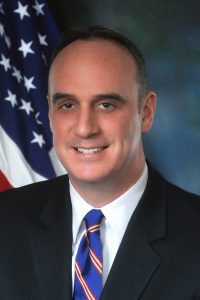

FMC Commissioner William P. Doyle
The Federal Maritime Commission (FMC) is losing another commissioner. Commissioner William P. Doyle announced in a press release yesterday (November 27th) that he is stepping down from the FMC:
Last week, I notified The President of the United States Donald J. Trump of my intention to leave the Federal Maritime Commission effective January 3, 2018. It has been an honor and a privilege to continue serving in the Trump Administration. I especially thank President Barack Obama for twice nominating and appointing me as a Commissioner. I have learned so much in this position, and I thank both Presidents for the opportunity to serve the United States of America.
With Mario Cordero recently leaving the FMC to become director at the Port of Long Beach, Doyle’s resignation will leave the FMC with only three instead of five commissioners.
Doyle has been part of the FMC for nearly five years since President Obama’s nomination of him was confirmed by the Senate on January 1, 2013.
The international shipping industry has gone through a great deal during those five years. Overcapacity and downward pressure on freight rates helped lead to the consolidating of ocean carriers into just a few major alliances while mergers, acquisitions, and even bankruptcy shrunk competition. Contentious labor contract negotiations hit the ports as did severe congestion, both of which requiring FMC attention. The Verified Gross Mass (VGM) rule went into effect, scaring shippers across the country and world, but ultimately went happened pretty smoothly with the FMC playing a role in that too.
Here’s how Doyle described those years in his press release:
Over the past five years there has been an enormous amount of change in the international maritime industry including consolidations, mergers, bankruptcies, and the advent of mega ocean carrier alliances. As a Commissioner, I have been intimately involved and successful in negotiating terms and conditions into carrier alliance agreements. This has provided additional safeguards from the alliances using their collective market power to drive down the rates of U.S-based suppliers, service providers, and small businesses – such as tugs, barges, bunker providers, equipment lessors, drayage/truckers, and marine terminals.
Over the past several years the Commission has been very busy. I’ve had the opportunity to find reasonable compromises with some of the world’s largest ocean carrier companies and build solid working relationships with governments that oversee international oceanborne trade.
Looking back, I am pleased with the outcome of the 2014-2015 West Coast labor – management negotiations. I worked directly with White House cabinet secretaries, management and labor helping to conclude the negotiations – chassis was a big issue, as a lot of folks did not understand the labor/management sensitivities around the equipment.
Of course, the FMC is also involved in talks and negotiations with other countries over shipping matters. Commissioner Doyle was directly involved in such meetings and consultations with other countries.
I also had the opportunity to work with officials from Panama, European Union, China, Greece, and the Netherlands. I am particularly pleased with the outcome serving as Co-chair of the U.S.-China Bilateral Maritime Consultations.
During my tenure as Co-chair, the Peoples Republic of China began to move its oceanborne international tax system from a business tax to a value added tax (VAT) regime. I explained to China at the time, that businesses in the U.S. are seeking clarity and guidance on the new VAT rule as well as confirmation from China that the VAT is being applied fairly to all businesses. I also highlighted that companies are concerned that they may be paying too much on the VAT and would like to know the reimbursement process. Further, if businesses were paying too little, they were concerned that they would be billed or penalized later.
I worked directly with China’s Ministry of Transport, Ministry of Finance and the State Administration of Taxation. China was very attentive to the concerns of U.S. businesses. Ultimately, China issued a series of circulars, starting with Circular 106, exempting portions of shipping transportation from the VAT.
China’s VAT was a big deal for shippers and received several posts on this blog. The FMC did an excellent job of bringing U.S. shippers’ concerns about the VAT to China. Ultimately, there were several exemptions made for the shipping industry.
Doyle also talked in the press release about preparation for the VGM rule, fallout from Hanjin’s bankruptcy, the FMC hosted Global Regulatory Summit, and the Panama Canal expansion.
What Doyle did not bring up was why he is resigning from the FMC.
In an article about Doyle’s resignation in the Loadstar, Alexander Whiteman brought up speculation by some that it has to do with President Trump wanting to purge President Obama’s appointees and by others that Doyle is looking to move into a role with one of the world’s major shipping lines.
While both seem like little more than speculation, the latter seems more likely to me.
In his bio on FMC.gov, Doyle’s experience in the industry is highlighted:
Commissioner Doyle served over a decade as officer in the U.S. Merchant Marine as a marine engineer aboard numerous classes of vessels. Combined, Commissioner Doyle has over 20 years of experience in the transportation industry, including both the maritime and energy sectors. Throughout his career, he has held several senior executive positions in the industry.
On top of that, Doyle ended the press release with, “I am looking forward to what comes next in my career.”
Discover more from reviewer4you.com
Subscribe to get the latest posts to your email.






